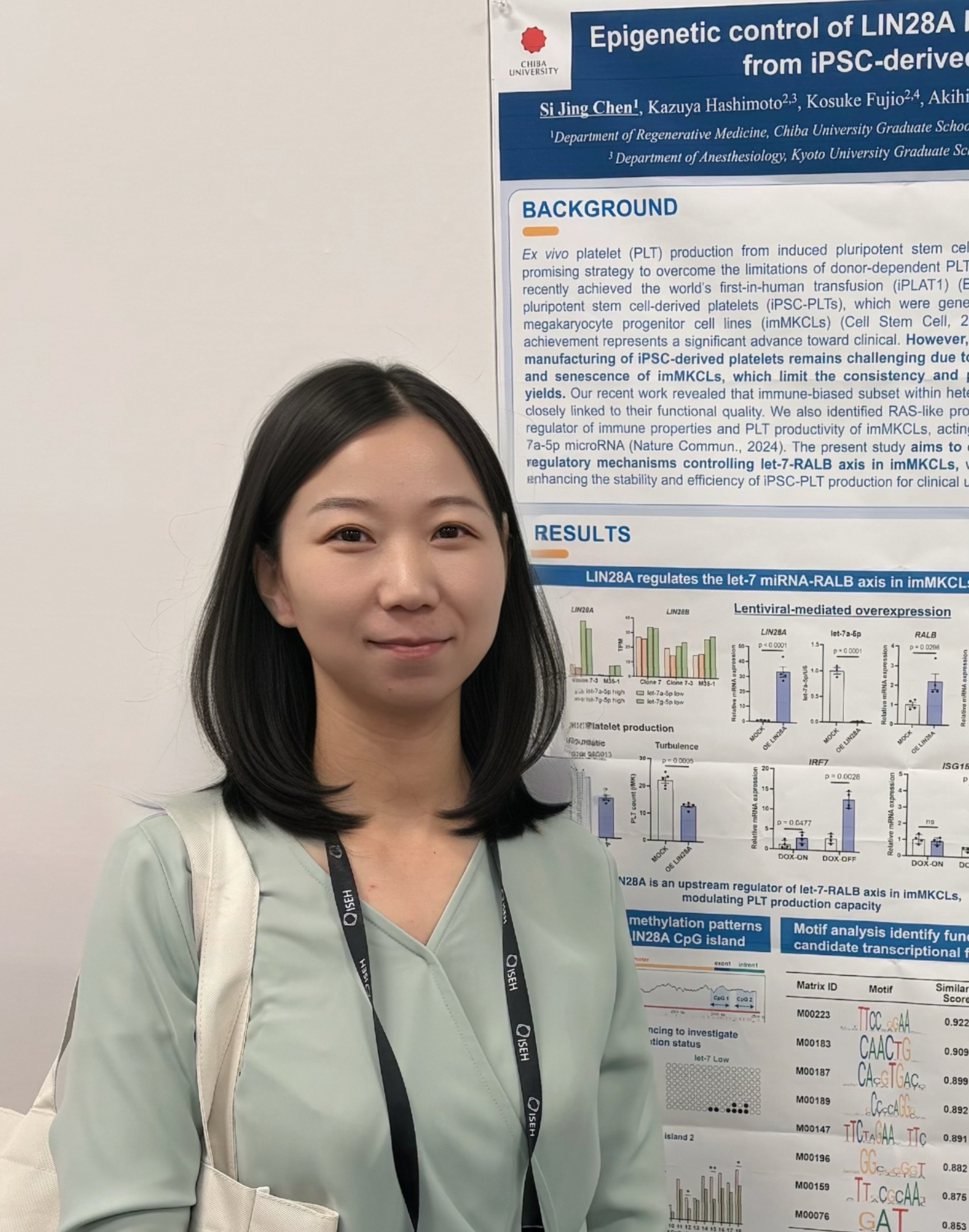
Si Jing Chen, Ph.D., is an assistant professor at the Graduate School of Medicine, Chiba University, Japan. She earned her Ph.D. from Kyushu University in 2016 and subsequently pursued postdoctoral training at the Center for iPS Cell Research and Application (CiRA), Kyoto University. In 2023, she joined the Laboratory of Innovative Regenerative Medicine at Chiba University. Dr. Chen’s current work integrates stem cell biology, hematopoiesis, and regenerative medicine, with a particular focus on optimizing platelet generation from induced pluripotent stem cells (iPSCs) derived megakaryocytes, with the goal of establishing a donor-independent platelet supply for clinical applications. Additionally, she investigates the immune regulatory roles of megakaryocytes and hematopoietic cells in disease pathogenesis, leveraging iPSC-derived models to advance therapeutic development.
Tuning immune signaling in iPSC-derived megakaryocytes to improve platelet production
Si Jing Chen1, Naoshi Sugimoto2, Naoya Takayama1, Koji Eto1,2.
1Department of Regenerative Medicine, Graduate School of Medicine, Chiba University, Chiba, Japan; 2Department of Clinical Application, Center for iPS Cell Research and Application (CiRA), Kyoto University, Kyoto, Japan
Introduction: Platelet transfusion is a standard treatment for thrombocytopenia but is limited by donor shortages, contamination risks, and transfusion refractoriness. Ex vivo production of platelets from induced pluripotent stem cells (iPSCs) represents a promising alternative. We previously established immortalized megakaryocyte progenitor cell lines (imMKCLs), enabling clinical-scale production of iPSC-derived platelets (iPSC-PLTs) in a turbulent flow-based bioreactor (Ito et al. Cell, 2018), leading to the first-in-human clinical study of autologous iPSC-PLTs transfusion (Sugimoto et al. Blood, 2022). However, cellular heterogeneity in imMKCLs continues to hinder consistent and efficient iPSC-PLT production. To address this, we applied microRNA switch technology and unexpectedly identified an immune-biased subpopulation in imMCKLs characterized by reduced let-7 activity. This subset exhibited activated immune-related signaling and exerted a dominant negative effect, arresting proliferation and impairing iPSC-PLT yield. Further study revealed RAS-like proto-oncogene B (RALB) as a key modulator of immune phenotype and iPSC-PLT productivity in imMKCLs (Chen et al. Nature Communications, 2024). In this study, we investigate the upstream epigenetic and transcriptional regulation of the let-7–RALB axis to better understand and improve iPSC-PLT production.
Methods: We employed DNA methylation (bisulfite) analysis, transcription factor motif analysis, and siRNA-mediated gene knockdown to identify and validate upstream regulatory factors affecting let-7-RALB axis and final iPSC-PLT production.
Results: According to bulk RNA-seq and bisulfite sequencing analysis, we identified Lin-28 homolog A (LIN28A) as a negative regulator of let-7a-5p in imMKCLs, with its expression governed by DNA methylation. Notably, differential methylation patterns distinguished imMKCL subpopulations with high versus low let-7a-5p activities. Lentiviral-mediated LIN28A overexpression activated immune-related pathways and suppressed iPSC-PLT production. To uncover upstream regulators of LIN28A, we performed transcription factor motif analysis and siRNA-mediated knockdown, which identified signal transducer and activator of transcription 1 (STAT1) as a key regulator. STAT1 knockdown downregulated immune-related signaling, decreased he expression of CDKN2A and secretion of interleukin-8 (IL-8), and significantly enhanced iPSC-PLT yields. Notably, pharmacologic inhibition of STAT1 phosphorylation using flavopiridol or fludarabine boosted iPSC-PLT generation, further supporting its regulatory role.
Conclusion: Our findings define a novel STAT1-LIN28A-let-7a-5p-RALB axis that links immune signaling to platelet production in imMKCLs. This pathway represents a potential target for optimizing iPSC-PLT yields and quality through tuning immune signaling. These insights have critical implications for improving and standardizing the industrial-scale manufacturing of iPSC-PLTs for clinical application.
This study was supported in part by the Project for Core Center for iPS Cell Research (JP22bm0104001) and the Project for Regenerative / Cellular Medicine and Gene Therapies under Grant Number JP22bm0704051(K.E.) and JP23bm1123028 (N.S.) from Japan Agency for Medical Research and Development (AMED); and a grant-in-aid for scientific research (S) (21H05047, K.E.), a grant-in-aid for early-career scientists (22K13124, S.J.C.), a grant-in-aid for challenging research (23K18299, K.E.), and a grant-in-aid for scientific research (C) (25K10397, S.J.C.) from the Japan Society for the Promotion of Science (JSPS); grants from SENSHIN Medical Research Foundation (S.J.C.), and SHIONOGI Infectious Disease Research Promotion Foundation (S.J.C.); a grant from the Canon Foundation (K.E.), and R&D grant from the New Energy and Industrial Technology Development Organization (NEDO) (JPNP23028, K.E.)..
[1] iPSC, Megakaryocyte, Platelet production, STAT1, LIN28A, let-7, RALB